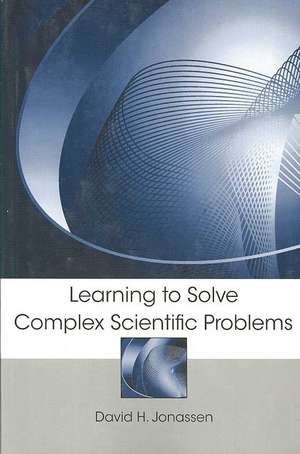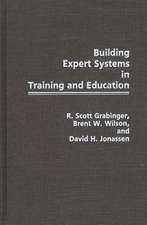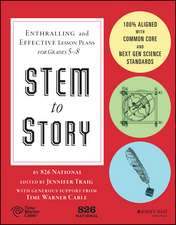Learning to Solve Complex Scientific Problems
Editat de David H. Jonassenen Limba Engleză Paperback – 11 iun 2007
Important features of this volume include discussions on:
*how problems are represented by the problem solvers and how perception, attention, memory, and various forms of reasoning impact the management of information and the search for solutions;
*how academics have applied lessons from cognitive science to better prepare students to solve complex scientific problems;
*gender issues in science and engineering classrooms; and
*questions to guide future problem-solving research.
The innovative methods explored in this practical volume will be of significant value to science and engineering educators and researchers, as well as to instructional designers.
| Toate formatele și edițiile | Preț | Express |
|---|---|---|
| Paperback (1) | 475.38 lei 43-57 zile | |
| Taylor & Francis – 11 iun 2007 | 475.38 lei 43-57 zile | |
| Hardback (1) | 953.72 lei 43-57 zile | |
| Taylor & Francis – 11 iun 2007 | 953.72 lei 43-57 zile |
Preț: 475.38 lei
Preț vechi: 559.27 lei
-15% Nou
Puncte Express: 713
Preț estimativ în valută:
90.97€ • 95.21$ • 75.71£
90.97€ • 95.21$ • 75.71£
Carte tipărită la comandă
Livrare economică 31 martie-14 aprilie
Preluare comenzi: 021 569.72.76
Specificații
ISBN-13: 9780805859195
ISBN-10: 0805859195
Pagini: 416
Dimensiuni: 152 x 229 x 22 mm
Greutate: 0.54 kg
Ediția:1
Editura: Taylor & Francis
Colecția Routledge
Locul publicării:Oxford, United Kingdom
ISBN-10: 0805859195
Pagini: 416
Dimensiuni: 152 x 229 x 22 mm
Greutate: 0.54 kg
Ediția:1
Editura: Taylor & Francis
Colecția Routledge
Locul publicării:Oxford, United Kingdom
Public țintă
Postgraduate and ProfessionalCuprins
Contents: Introduction. Part I: Cognitive Science Views of Problem Solving. D. Jonassen, What Makes Scientific Problem Solving Complex. J. Funcke, P. Frensch, Complex Problem Solving—The European Perspective: 10 Years After. J. Price, R. Catrambone, R. Engle, When Capacity Matters: The Role of Working Memory in Problem Solving. F. Oswald, Z. Hambrick, On Keeping All the Plates Spinning: Understanding and Predicting Multi-Tasking Performance. P. Cheng, Representing Complex Problems: A Representational Epistemic Approach. M. Rosen, S.M. Fiore, E. Salas, Of Memes and Teams: Exploring the Memetics of Team Problem Solving. Part II: Scientific Views of Problem Solving. C. Ogilvie, Moving Students From Simple to Complex Problem Solving. S. Ryan, J. Jackman, P. Kumsaikaew, V. Dark, S. Olafsson, Use of Information in Collaborative Problem Solving. G. Gray, F. Costanzo, Making Dynamics Interactive. S. Rebello, L. Cui, A. Bennett, D.A. Zollman, D.J. Ozimek, Transfer of Learning in Problem Solving in the Context of Mathematics and Physics. S. Ryan, J. Jackman, S. Olafsson, V. Dark, Meta-Problem Spaces and Problem Structure. M. Ogot, G. Okudan, Educating for Complex Problem Solving Using a Theory of Inventive Problem Solving (TRIZ). A. Bhandari, L. Erickson, M. Steichen, W. Jacoby, Preparing Students to Work Effectively as Members of Interdisciplinary Design Teams. B. Bogue, R. Marra, Addressing Gender in Complex Problem Solving. D. Jonassen, R. Engle, P. Cheng, E. Salas, Part III: Research Agenda for the Future: What We Need to Learn About Complex, Scientific Problem Solving.
Recenzii
"…the book meets its objective through a clear, non-linear structure and readable, jargon-free text…Overall, Jonassen’s handbook undertakes a difficult and important task in its attempt to provide a serviceable tool to guide the development of instruction intended to enhance the problem-solving capacity of learners in many contexts grounded in evidence from empirical research."—Educational Technology
Descriere
Learning to Solve Complex Scientific Problems is an immensely useful read offering the insights of cognitive scientists and engineering and science educators who explain methods for helping students solve the complexities of everyday, scientific problems. Important features of this volume include discussions on:
- how problems are represented and how perception, attention, memory, and various forms of reasoning impact the management of information and search for solutions;
- how academics have applied lessons from cognitive science to better prepare students to solve problems;
- gender issues in science and engineering classrooms; and
- questions to guide future problem-solving research.




















